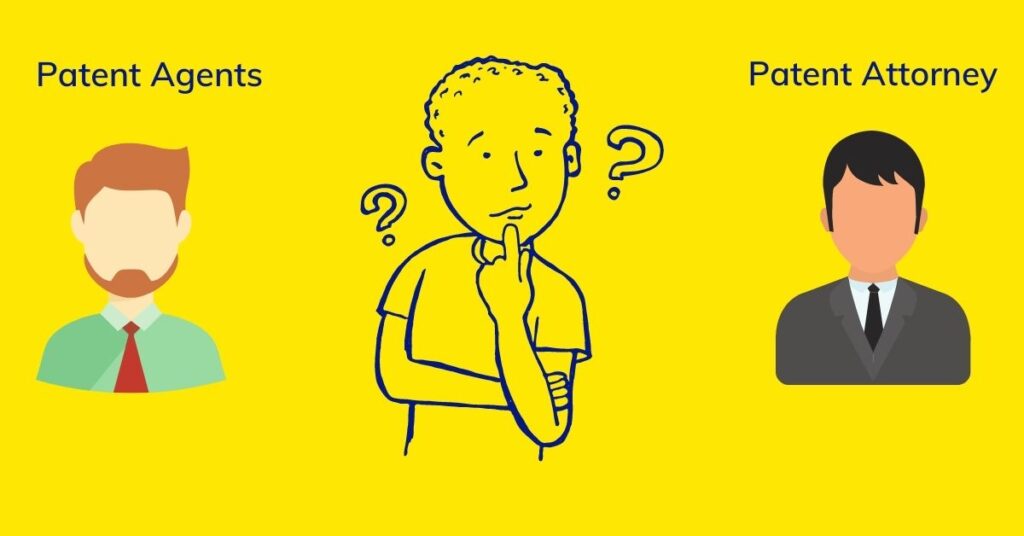Although the terms ‘patent agent’ and ‘patent attorney’ are frequently used interchangeably around the world, however, there are a lot of differences between the two terms. They are different in terms of their qualifications as well as the functions they can carry out.
The major role of patent agent is patent prosecution process, and they practice in front of the controller whereas the patent attorney’s main role is patent litigation and the practice in front of court. This blog will illuminate the differences between patent agent and patent attorney and elucidate their respective roles.
Who is Patent agent?
Patent agent is a qualified person whose job profile is to draft and file a patent application (which is also termed as prosecute patents).
The job profile of patent agents allows them to offer patentability opinions and help with the preparation and filing of documentation related to patent applications.
Patent agents also assist inventors with completing and submitting all patent-application paperwork, searching for prior art, writing the inventor’s legally enforceable claims of ownership to the invention, perform patent landscape analysis and whitespace analysis, revising rejected patent applications, and deciding when it is best to abandon an application.
Assuming the fact that drafting a patent involves explicit technical as well as legal knowledge, only person skilled in both domains will be to accomplish the responsibilities of the patent prosecution.
Most importantly a patent agent locates whitespace opportunities which is an inactive zone in the technology where it is easy to find exclusivity and further go for whitespace analysis in business and patent.
Registered Indian patent agents can prosecute according to Section 126 of the Indian Patents Act, 1970 which foresees the credentials for becoming a patent agent. The legal prerequisites for becoming a patent agent are:
- Be a citizen of India.
- Above the age of 21 years.
- Have obtained a degree in science, engineering or technology from any University established under law for the time being in force in the territory of India.
- Have passed the qualifying exam.
The qualifying exam referred above is the Patent Agent exam that is conducted every year by the Controller general of patents. To qualify as a registered Indian patent agent passing the exam is mandatory.
In order to become a patent agent, a degree in science, engineering or technology is must whereas a degree in law is not mandatory. Moreover, an individual with law degree does not automatically be licensed as a patent agent unless he/she meets the legislative prerequisites.
As described in the section 127 of the Indian patents act, 1970 a patent agent is entitled to:
- Practice before the Controller; and
- Prepare all documents, transact all business, and discharge such other functions as may be prescribed in connection with any proceeding before the Controller under this Act.
Meaning of Patent attorney/ who are patent attorney?
In the beginning it is essential to note that in Indian decree, the term ‘Patent attorney’ is not mentioned. In fact, it is usually used interchangeably with a patent agent. Nonetheless, an attorney is an advocate.
On account of this, a patent attorney is an individual who is authorised to deal with patent litigation because of holding a degree in law. This implies that an individual who has a law degree and has enrolled with a State Bar Council is an advocate who can deal with patent litigation and is hence a patent attorney.
Generally, the role of a patent attorney is the same as the responsibility of an advocate. Thus, a patent attorney can specifically deal with patent litigation.
This means that a patent attorney represents patent cases in the courts. It is important to note that a patent attorney cannot file for a patent. This means that a patent attorney is not allowed to do patent prosecution, only the litigation aspect of patents can be handled by him.
Conclusion-
Patentskart’s primary aim is to make an impact and this drive fuels the commitment and humanity that run deep through every action.
The services provided by the team are licensing target identification, Relative Growth (CAGR) in competitor patent portfolios, R&D locations & leading Markets across generations, most valuable patents, technology whitespace, and also patent whitespace analysis, patent prosecution, patent licensing, litigation support, patent infringement analysis, competitive landscaping, and portfolio management.
The core services include protection of the intellectual property (IP) and by providing high-end IP research and analytic solutions with visualization models and tools designed to offer valuable insights into complex IP decision-making scenarios combining with matter knowledge, competitive and industrial information.







